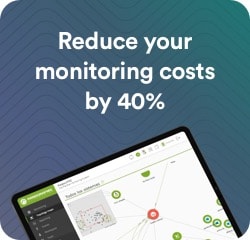The unstoppable digitization of recent years comes with a series of challenges such as the management of complex infrastructures or the need to protect data against the increase in cyberattacks. This is where MSPs come into play, helping companies improve their internal operations and become more competitive.
The numbers support this trend. According to the latest Gartner report, global IT spending reached $5.06 trillion in 2024, 6.8% more than 2023. However, not all investments have the same impact. While hardware sales experienced a slight decline, spending on software and IT services continued to grow. This change is especially relevant for MSPs. “For the first time, the level of external investment will be higher than the internal one,” explains John-David Lovelock, vice president and analyst at Gartner.
In this article we will explain what an MSP is, the services they offer and the advantages of relying on a third-party provider to manage your company’s technology environment.
What is a managed service provider (MSP)?
An MSP is a company that manages its customers’ IT systems and infrastructures remotely
The first MSPs emerged in the 1990s with the emergence of ASPs, which offered remote access to software and applications.
MSPs took some concepts from ASPs, but evolved into a different, more comprehensive model. Instead of focusing solely on specific applications, they took a comprehensive approach, taking care of managing the whole customer IT ecosystem. This includes from network and server maintenance, to technical support and cybersecurity management. In addition, some MSPs offer additional consulting, disaster recovery, or cloud migrations.
Common MSP customers are SMEs. More than 70% of them outsource the management of their IT infrastructure. However, large companies also use their services to expand the capabilities of their internal teams or to delegate specific areas of their technology operations.
Usually, MSPs use a collection system based on subscription or contract, which allows budgets to be managed flexibly, choosing the level of service that best suits current needs and adjusting it according to business demands.
Main features of a managed service provider (MSP)
MSPs combine proactive support, innovation and a high degree of specialization to adapt to the needs of their customers. Below, we will talk about some features that define your services.
Proactive support and 24/7 monitoring
While traditional technical support companies take a reactive approach known as “break/fix”, MSPs have a proactive stance based on continuously monitoring their customers’ IT systems to identify vulnerabilities, prevent failures and respond to threats in real time.
For example, they may monitor the performance of devices that are make up the network or detect unusual traffic patterns that could indicate unauthorized access attempts or malware activity.
This 24/7 monitoring is key to ensuring business continuity and data security.
Use of specific tools
MSPs use specific tools that make technological environment management easier.
The most common are:
- RMM Software: Remote monitoring and management tools are essential for MSPs as they allow them to centrally monitor all of their customers’ devices and systems and gain full visibility into IT infrastructure. Among the most used features there are software updates, the installation of security patches or the generation of reports on system status.
- Security software for endpoints: Protecting users’ devices is a priority. To that end, MSPs use security solutions designed specifically for endpoints. Among the most outstanding there are advanced antivirus or EDR tools that block threats in real time and analyze suspicious behaviors.
- Identity and access management tools (IAM): They are key to ensuring information security. They help MSPs manage permissions and implement multi-factor authentication (MFA) policies, ensuring that only authorized individuals have access to sensitive data.
- Backup management tools: They automate the creation of backups and their storage on local servers or in the cloud, providing efficient solutions against data loss.
- Back-office tools: MSPs also need to manage their own internal operations and often use back-office tools such as PSA (Professional Services Automation) to automate administrative tasks such as support ticket management, automation tools, and document management.
High level of specialization and technological innovation
MSPs usually have a team of experts in different technological areas. This allows them to offer a wide variety of services ranging from network and system administration to application maintenance and installation. In addition, they provide valuable strategic advice, helping clients achieve their goals.
Thanks to their knowledge and experience, MSPs are able to design solutions for companies of any size or sector. Whether it is a small retailer or a large manufacturing company, MSPs adjust their offering to meet the specific needs of each industry.
Another feature that defines them is their commitment to technological innovation. A clear example is the growing use of artificial intelligence (IA) to automate and optimize processes.
AI-based tools are especially useful in preventive maintenance tasks such as installing patches, assessing vulnerabilities, or simulating phishing attacks to test system security.
But the technological innovation of MSPs does not stop there. Little by little, they are starting to adopt technologies such as machine learning (ML), to analyze large volumes of data and identify behavior patterns that may pose a risk, or augmented reality (AR) to provide remote technical support in real time and assist users in solving complex problems.
Advantages of Working with an MSP
Companies working with a managed service provider (MSP) enjoy a number of advantages that directly impact business continuity.
The main ones are:
- Cost savings: By delegating the management of their IT infrastructure to an MSP, companies can reduce recruitment and training costs for internal staff.
- Experience and specialization: MSPs have experienced professionals in different areas such as networking, storage, and cybersecurity. In addition, they keep up with the latest technological advances in their sector.
- Security: Information protection is a priority for MSPs. According to the report “Gartner Magic Quadrant for Managed Security Services Worldwide” (2023), 74% of Spanish companies suffered a cyberattack in the last two years. MSPs take a proactive approach to cybersecurity, which involves monitoring their customers’ systems in real time to detect threats from malware, ransomware, and other malicious software. In complex technology environments, they implement advanced models such as Zero Trust (Zero Trust), enable encryption options, and conduct regular assessments to fix vulnerabilities and ensure a resilient and safe IT infrastructure.
- Regulatory compliance: MSPs not only implement strong security measures, they also ensure that companies comply with service level agreements (SLA) and industry-specific regulations such as GDPR, HIPAA, or PCI-DSS to avoid legal violations.
- Core Business Focus: By outsourcing IT operations, it is possible to free up internal resources and spend more time on strategic planning and core business activities.
- Technological innovation: As companies grow, so do their technology needs. MSPs make access to advanced tools and solutions easier without making large investments. This is particularly beneficial for SMEs with a more limited budget.
Most common services offered by MSPs
MSPs offer flexible and scalable solutions to adapt to changing business needs.
Some of the most common ones are:
- System and network management: They are responsible for the comprehensive maintenance of their customer IT infrastructure. They perform tasks such as monitoring network traffic, managing firewall rules, and regularly updating software and firmware to ensure proper system functioning.
- Cybersecurity services: They implement advanced solutions such as antivirus, anti-malware and spam filtering systems that protect their customers’ networks from cyberattacks.
- Backup and disaster recovery management: They perform regular backups to ensure data integrity and develop recovery plans that minimize outages in the event of serious incidents.
- Cloud migration: They help companies migrate their applications and services to the cloud, providing scalable and flexible solutions that adapt quickly to market demands.
- Help Desk and 24/7 technical support: MSPs also offer reactive support, that is, they deal with incidents and problems to minimize business downtime.
Cost and benefit model of hiring an MSP
Unlike traditional technical support companies, MSPs have a transparent and flexible pricing structure that responds to the needs of each customer.
The most common models are:
- Annual or monthly subscription: This model is based on a fixed cost depending on the services included. It is ideal for small businesses that need to plan their budget and avoid unforeseen expenses.
- Fixed rate per device: The price is calculated based on the number of managed devices.
- Fixed rate per user: The price will depend on the number of users using IT services.
- Custom models: Some MSPs design custom packages based on their customers’ needs. For example, they may include only critical monitoring and troubleshooting services or add extra features such as backups, data analysis, or reporting.
For many companies, MSPs offer the perfect balance between investment and scalability, as they can expand or reduce the scope of services at any time without compromising the quality of support.
Adaptability and ongoing support of MSPs
In a world where technological advances take place at a dizzying pace, managed service providers become strategic allies to innovate and improve competitiveness.
According to a recent survey by PwC, companies that hire the services of an MSP for strategic purposes are 1.6 and 2.4 times more likely to quickly reach new markets and take advantage of the business opportunities that arise.
Thanks to their experience and knowledge, MSPs can understand the needs of each project and offer custom advice.
A good example of their innovative approach is the adoption of Cloud technology. In its study “The future of Operations: Maximize Value From the Cloud with a Strategic Mindset” (2023), technology consultancy Forrester Research surveyed 304 business decision makers. 83% of respondents said their company will maintain or increase cloud investment over the next two years. However, many SMEs do not have the resources to manage these complex infrastructures internally. MSPs offer cloud migration, storage, compute, and application management solutions so that small businesses can also take advantage of the potential of this technology.
On the other hand, the implementation of services in hybrid or multi-cloud environments not only achieves business goals, but also contributes to reducing environmental impact and improving operational efficiency. MSPs can monitor the carbon footprint generated by business activity, encourage investment in efficient technologies, and centralize critical services in closer data centers. This approach makes it possible to reduce energy consumption and align the technology strategy with corporate sustainability goals.
Conclusion
The emergence of MSPs set a milestone in the industry, allowing companies of all sizes to access technologies that were previously only available to a few. Its specialization and ability to design tailor-made solutions has managed to accelerate digital transformation in multiple sectors.
In addition, MSPs play an important role for system security, especially in a context such as the current one, where cyberattacks are increasingly frequent and sophisticated.
By integrating Pandora FMS into their service offer, MSPs may deliver superior IT management. Our platform offers unified visibility of the whole IT infrastructure, making access to customer teams from any location easier to solve incidents, perform updates or maintenance tasks.
Pandora FMS also allows you to create custom dashboards, which display key information about system performance, such as CPU usage, memory, disk space, and other indicators. In addition, it sends instant alerts if it detects any problems or anomalies in the network environment so that IT technicians can act quickly and minimize the impact on business operations.
With their proactive approach, MSPs have transformed the way companies manage their technology. Pandora FMS, as part of its offer, contributes to creating a more secure business environment prepared to face the challenges of the Digital Age.
Parlez à l'équipe de vente, demandez un devis ou posez vos questions sur nos licences









